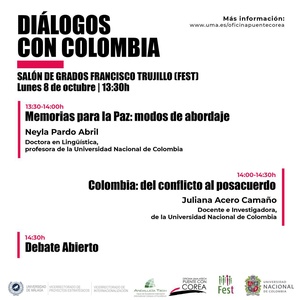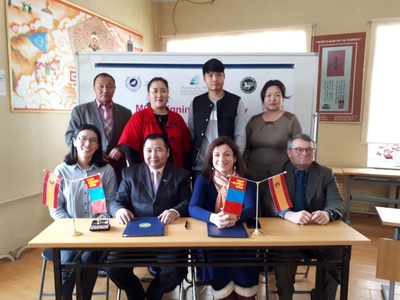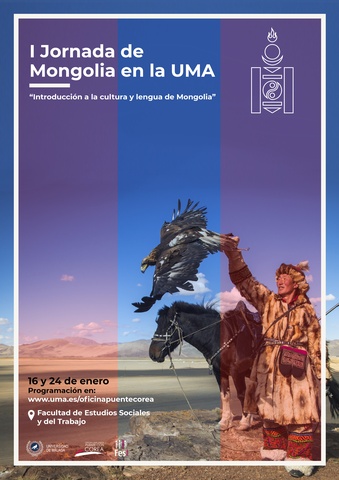Book Club: Librería Atípica
Activity: Free of charge
Venue: Faculty of Social and Labour Studies, University of Malaga, Spain.
Dates: October 2024- May 2025
Limited places
The book club Librería Atípica is an initiative of Cátedra Asia and the East Asian Studies Department of the University of Málaga.
Our book club
Normally we practice reading individually, but we also enjoy recommending and commenting on books that have been special to our friends and family. At the Librería Atípica book club, we want to extend this enjoyment of reading by conversing in an atypical environment that invites us to reach a state of relaxation and meditation.
Who is our target audience?
The book club of Librería Atípica is a space aimed at students of the Degree in East Asian Studies at the University of Malaga and the university community in general (students, teaching and research staff – PDI, and administrative and service staff – PAS).
What is the book club about?
With the aim of disseminating current Korean literature by women writers, a number of works by women writers have been selected and will be announced well in advance. To make the discussion more enriching, participants are asked to read the selected works in advance. This will allow for greater participation and a deeper exchange of ideas during the sessions.
The selected works invite self-reflection and the environment creates a symbiosis between thought and sensations, generating relaxation and meditation. Through literary discussions and complementary activities such as aromatherapy, music therapy, guided meditation and artistic expression, the club offers a unique experience that combines critical analysis with emotional well-being and creativity.
Required materials
Participants should purchase the books selected for the sessions, which will allow them to fully enjoy the readings and actively participate in the discussions. We appreciate your understanding, as this guarantees a more enriching and personalized experience for each participant.
Schedule:
Time: 14:30 – 15:15 (45 minutes)
- October 24, Thursday: Si no podemos viajar a la velocidad de la luz I
- November 21, Thursday: Si no podemos viajar a la velocidad de la luz II
- December 18, Wednesday: Nuestros tiempos felices
- February 20, Thursday: Sobre mi hija
- March 20, Thursday: El impulso I
- April 24, Thursday: El impulso II
- May 22, Thursday: Final round table with participants
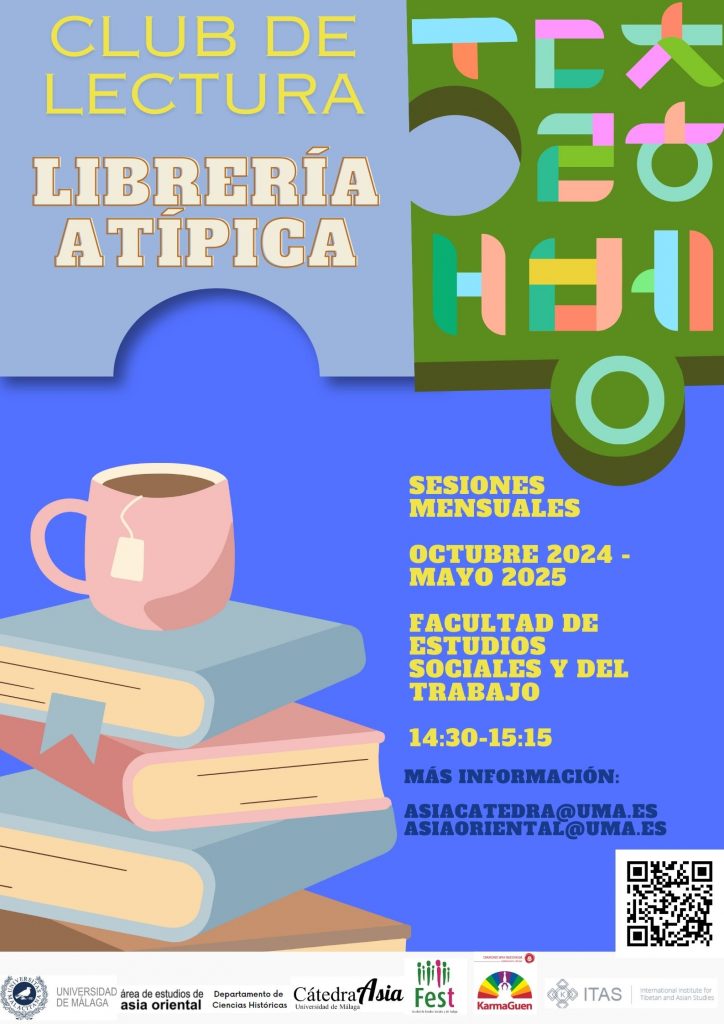
III SUMMER COURSE: TRANSLATION OF KOREAN LITERATURE, UNIVERSITY OF MÁLAGA
The Department of Historical Sciences through Area of East Asian Studies, the Faculty of Social Studies and Labor at the University of Málaga, and the Literature Translation Institute of Korea (LTI, Korea) organized the “Summer Course: Translation of Korean Literature” at the Faculty of Social Studies and Labor. The objective is to provide specific training and necessary tools for those interested in Korean-Spanish translation and to initiate the next generation of Korean-Spanish translators.
The course was be led by Professor Antonio J. Doménech, a professor in the Area of East Asian Studies at UMA and an expert in Korean-Spanish translation. The course also featured the participation of the author of the text to be translated.
The course was conducted in 12 sessions from June 12, 2024, to July 3, 2024. The course dates were June 12, 13, 14, 17, 18, 19, 20, 27, and 28 from 10:00 AM to 1:00 PM, and July 1, 2, and 3 from 10:00 AM to 1:00 PM. The course comprises 60 hours of training, equivalent to 2 ECTS credits.
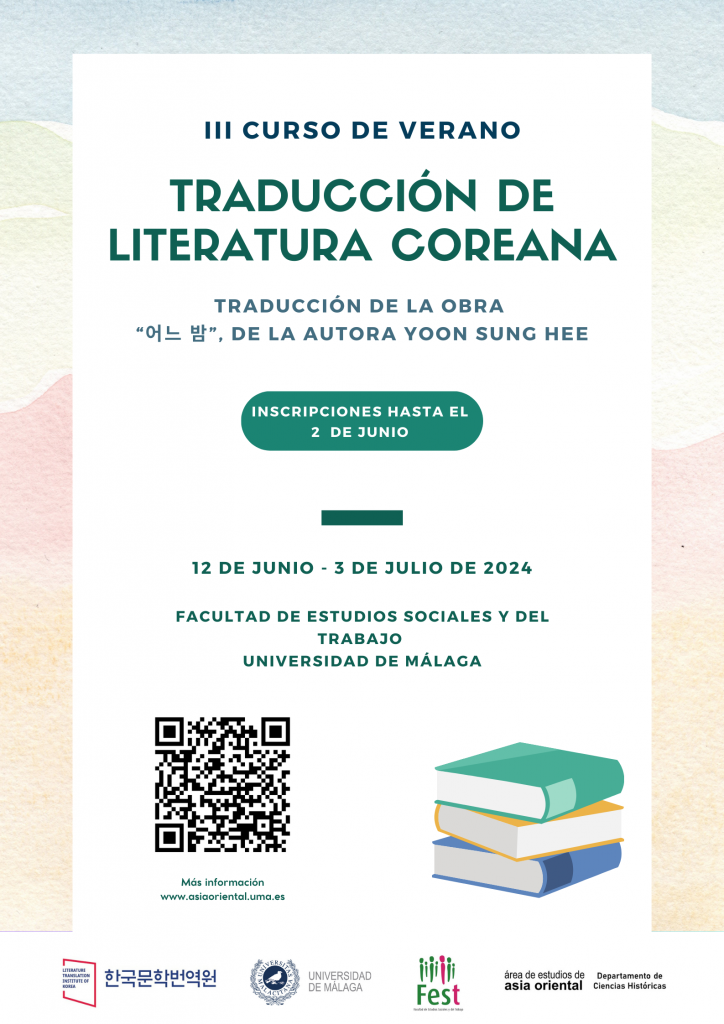
COURSE "EXPLORE YOUR CREATIVITY THROUGH YADAM"

In today’s society, generating not only optimal but also original and creative ideas and solutions has become fundamental. Valuing the combination of digital and traditional tools, collective creative processes versus individual concepts, and physical and virtual spaces is essential to harness the surrounding possibilities. Against this backdrop, this course introduced students of the Degree in East Asian Studies at the University of Málaga to artistic creation using highly significant texts from Korean literature, specifically Yadam literature translated into Spanish, with a special focus on the presence of gisaeng slaves in these texts.
The course was structured into two sessions held over two days, April 29 and May 6, 2024. In the first session, participating students were introduced to theoretical concepts such as constructive imagination, divergent thinking, and original thinking through practical activities, and multidisciplinary teams were formed. Following this, the creative process of designing a performative project began, working on elements such as words, light, sound, and movement with the support and direction of the professionals leading the course. The second session involved general rehearsals and the final presentation of the project.
This educational project was carried out within the framework of the research project “AKS Path to Equality: Korean Studies Network on Inclusiveness” (AKS-2021-INC-2250002) funded by the Ministry of Education of Korea, the R&D project “ASIA-SLAVES 2020” (PID2020-116910GB-I00) granted by the Ministry of Science and Innovation, (PIE 22-046 실-ART), and by the Spanish Association for East Asian Studies (AEEAO).
RESEARCH METHODOLOGY SEMINAR IN KOREAN STUDIES: SOCIAL AND CULTURAL HISTORY OF MARGINALITY AND INCLUSION
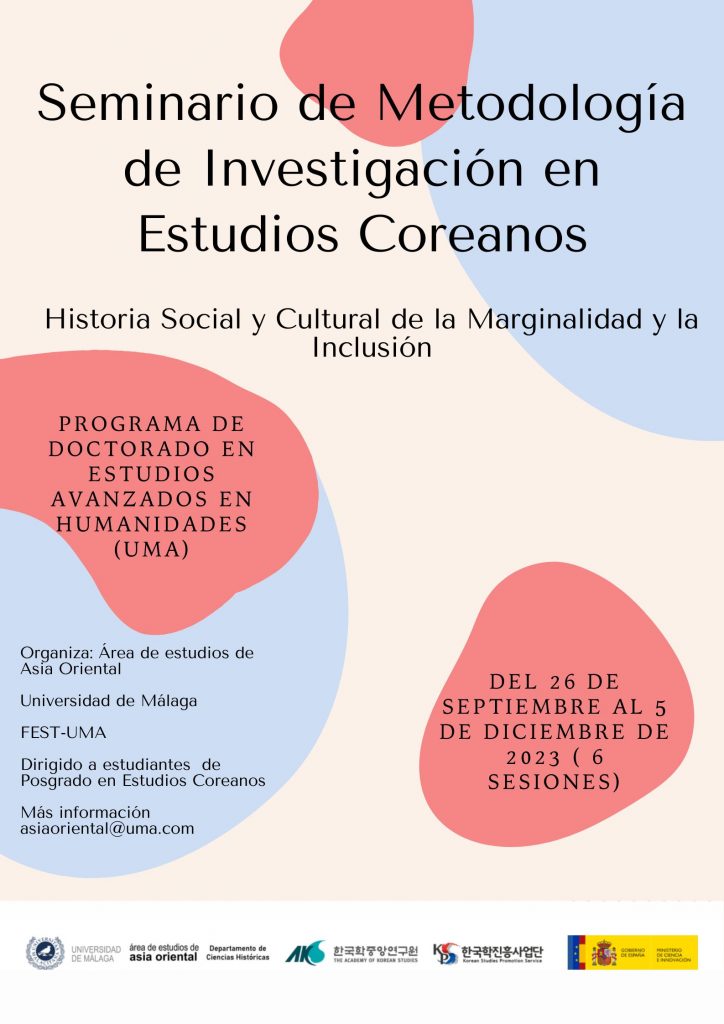
The seminar offered a critical approach to research methods and techniques in the field of Korean Studies through 6 theoretical and practical sessions. It focuses on the study of social and cultural history related to marginality and inclusion. The goal of the seminar is to introduce participants to the main historiographical trends related to the central research theme, as well as to the specific research methods used within these historiographical trends. Additionally, it aims to critically explore the development of specific methodologies for the individual research of the participants.
The seminar was structured into six sessions. The first part of the seminar focused on analyzing different research methodologies used in projects related to marginality and inclusion. This segment consisted of brief presentations based on the proposed readings, followed by practical sessions where the main elements of the methodologies were analyzed. These presentations involved practical work, reading, and critiquing various significant historiographical works, with the aim of reverse-engineering the research methods used to produce these works.
The second part of the seminar focused on the individual presentation of the research methodologies developed by each participant in relation to their research questions. These presentations aim to outline the intellectual context of each research project and the main methodological contributions associated with them. This segment emphasized the relationship between the research problem and the methodology employed to address it.
Professor: Luis Botella
Sessions:
- September 26, 2023: Introduction to methodology.
- October 10, 2023: Methodological analysis 1.
- October 24, 2023: Methodological analysis 2.
- November 7, 2023: Presentation of individual methodologies by participants.
- November 21, 2023: Presentation of individual methodologies by participants.
- December 5, 2023. Presentation of individual methodologies by participants.
Project: "KF E-School of Korean with BTS at the University of Málaga" by the University of Málaga and the Korea Foundation
The Department of East Asian Studies at the University of Málaga, in collaboration with the Korea Foundation, developed a three-year joint project that offered the course “KF e-School of Korean with BTS at the University of Málaga.”
Designed to enhance the education of Korean language students and refine their language skills, the course schedule has been tailored to align with the degree program content and academic terms of the university. Consequently, each year of the project includes two editions corresponding to the subjects of each semester.
In this Korean language course, held at the Faculty of Social Studies and Labour, students learned Korean using the “Learn! Korean with BTS” materials, which incorporate exercises and examples based on the famous Kpop group BTS.
Course Edition History:
- Final Year of the Project:
– September 20, 2023 – December 13, 2023
– February 26, 2024 – May 23, 2024
- Second Year of the Project:
– October 5, 2022 – December 22, 2022
– February 7, 2023 – May 3, 2023
- First Year of the Project:
– November 25, 2021 – January 20, 2022
– February 23, 2022 – May 26, 2022
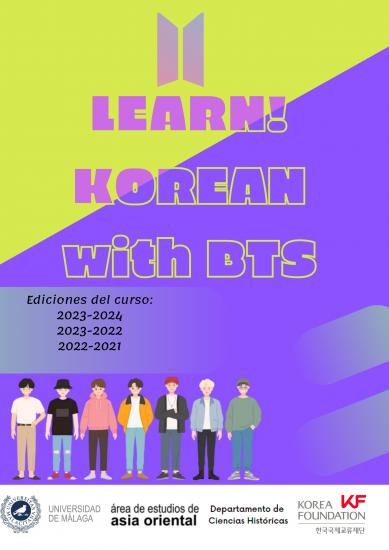
SUMMER COURSES: TRANSLATION OF KOREAN LITERATURE
The Area of East Asian Studies of the Department of Historical Sciences, the Faculty of Social Studies and Labor at the University of Málaga, and the Literature Translation Institute of Korea (LTI Korea) organized the “Summer Course: Translation of Korean Literature” at the Faculty of Social Studies and Labor. The course aimed to provide specific training and necessary tools to those interested in Korean-Spanish translation and to initiate a new generation of Korean-Spanish translators.
The course was taught by Antonio J. Doménech, professor of the East Asian Studies Area at UMA and an expert in Korean-Spanish translation. Each edition also featured participation from the author of the text to be translated.
It was organized into 12 sessions, equivalent to 2 ECTS credits, held at the Faculty of Social Studies and Labor, University of Málaga (Teatinos Expansion). Past editions of the course have focused on translating the following works:
- “슬픈 어항” by Kim Soom.
- “마음의 부력” by Lee Seung-U.
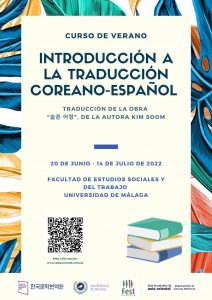
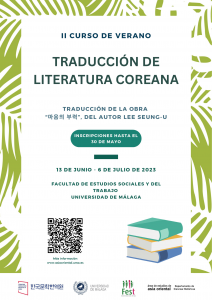
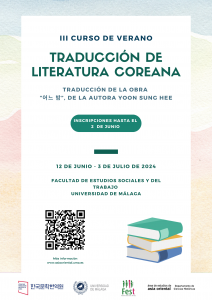
SEMINAR ON SLAVERY IN KOREA (16TH-20TH CENTURY)
In 2022, the Area of East Asian Studies held a seminar that, through several sessions, offered a critical approach to the main studies on slavery during the Joseon Dynasty, along with a review of the documentary typology used in various studies. The seminar aimed to familiarize participants with the fundamental bibliography on slavery in Korea during the transition period between the Joseon dynasty and the 20th century. It included bibliography from earlier periods to provide enough context to understand the evolution of this institution in Korean society and culture.
Responsible Researchers: Dr. Aurelia Martín Casares, Dr. Antonio J. Doménech, and and Dr. Luis A. Botella.
Sessions:
- Introductory session: Slavery in Korea, Introduction and Key Debates.
- Session 2: Slavery, Society, and Economy. The social structure in Joseon and the place of the nobi in society and the economy. Social censuses of the Joseon dynasty and Reconstruction of slave markets in perspective.
- Session 3: Liberation attempts and abolitionist discourses in Joseon: from ideas to feelings. Commemorations, emancipations, and political speeches.
- Session 4: The daily life of slaves and cultural discourses about them. Some cases of slaves who wrote, mainly the diaries of the yangban lords, along with judicial documents as sources to approach this reality, will be discussed.
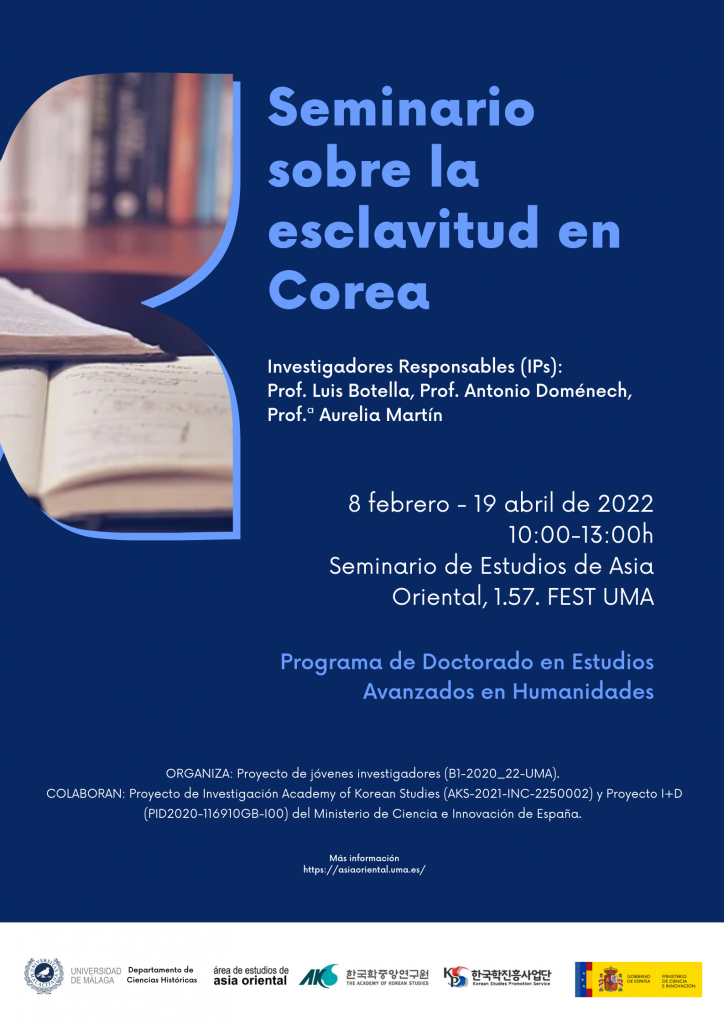
Training Seminar: Gender in Korean Studies
From the Area of East Asian Studies at UMA, as part of the Gender Equality Unit initiative “Korean Wave“, a training workshop was held on Qualitative Research with a Gender Perspective in the context of Korean Studies: Building Creative Spaces of Understanding, which took place over three sessions at the beginning of the 2021/2022 academic year.
The objective of this workshop was to train students in the East Asian Studies program on how to approach qualitative research with a gender perspective in the mentioned area.
To achieve this, the course was divided into two distinct parts. First, an introduction to qualitative research with a gender perspective was provided, followed by a focus on South Korea. The theoretical training was complemented by an approach to the demands of South Korean women, including creativity and the arts in their reflection. In the final part of the workshop, a group performative exercise was conducted to critically engage students with the reality of South Korean women and the demands of the country’s feminist movements, while enhancing teamwork, imagination, and creativity.
E-SCHOOL COURSES. KOREA FOUNDATION + CENTER FOR ASIAN STUDIES (UANL)
The Korea Foundation e-School Program for Latin America is a program initiated by the Ministry of Foreign Affairs of South Korea. Since August 2014, the Autonomous University of Nuevo León (UANL), through the Center for Asian Studies (CEA), has been the venue for this program for all of Latin America. The courses are free, as they are funded by the Korea Foundation, with official recognition from both the Korean government and the UANL. Members of the Area of East Asian Studies at the University of Málaga have collaborated on the project and have taught courses aimed at understanding the culture, society, economy, politics, etc., of Korea and other countries in East Asia.
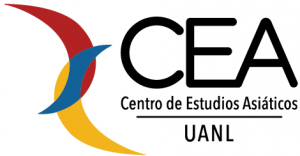
INTRODUCTORY COURSE TO KOREAN-SPANISH TRANSLATION
Between 2015 and 2018, the Area of East Asian Studies offered four editions of the Introductory Course to Korean-Spanish Translation, organized by the University of Málaga and the Literary Translation Institute of Korea (LTI Korea).
The course consisted of 60 hours in which students read, translated, corrected, and discussed a specific work of Korean literature and also had the opportunity to meet its author. The works translated during the different editions of the course were:
- “사육장 쪽으로”, by 편혜영 (Pyun Hyeyoung).
- “기린이 아닌 모든 것에 대한 이야기”, by 이장욱 (Lee Jangwook).
- “국화를 안고”, by 전성태 (Jeon Seong-tae).
- “산책하는 이들의 다섯 가지 즐거움”, by 김연수 (Kim Yeong-soo).
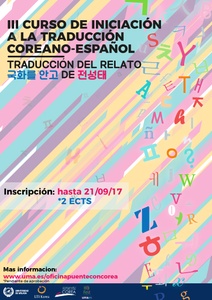
TOPIK EXAM AND COURSES
The relationship between the Area of East Asian Studies at the University of Málaga and the Korean language exam TOPIK (Test of Proficiency in Korean) is developed through three aspects:
- TOPIK. The Language Center of the General Foundation of the University of Málaga (FGUMA) organizes calls for the Korean language exam TOPIK, which is divided into two exam sessions, corresponding to levels TOPIK 1 and TOPIK 2. The project director for the exam is Professor Antonio Doménech and is coordinated by Professor Eun Kyung Kan, members of the Area.
- Annual Korean courses (levels A1-B1). FGUMA, through its Language Center and in collaboration with the Area, offers vacancies for.
- TOPIK II: Written Preparation Course. These courses are organized by the General Foundation of the University of Málaga together with Professor Eun Kyung Kang.
EXPERT UNIVERSITY COURSE IN INTERCULTURAL MANAGEMENT AND SOCIOECONOMIC DEVELOPMENT IN THE HISPANO-KOREAN FIELD
Course aimed at training experts in the field of social, tourism, economic, and commercial relations between Spain, Latin America, and South Korea through an innovative and multicultural vision. In this course, we have relevant professors related to Korean studies, such as Jill Leslie Tao (Incheon National University), Kim Sul-hee (Ministry of Foreign Affairs of the Republic of Korea), Antonio J. Doménech (University of Málaga), or Chang Hyun-sik (Incheon National University and Korea International Cooperation Agency).
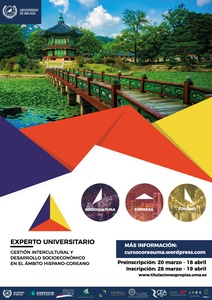
CREATIVE SPACES COURSES
The Creative Spaces courses, jointly organized by Kareidoskopio, the educational arm of Somos MU, and the Vice-Rectorate for Strategic Projects at the University of Málaga, in collaboration with Ateneo Málaga. The courses are aimed at anyone who wants to develop their creativity. Creative Spaces emerges as a creative training course aimed at those people who do not have room to explore these areas in their daily or work life and also for those creative people who want to pose a new challenge.
OTHER COURSES AND WORKSHOPS
- Workshop on Text Review and Correction Tools (2018).
- Korea through its religions, history, and literature (2017).
- Traditional Korean Painting Workshop (2016).
- Traditional Korean Dance Workshop (2016).
- Korean Alphabet Workshop Hangul Day (2016).
- Korean Film and Literature Workshop (2015).
- Korean Cooking Workshop (three throughout 2015).
- Traditional Korean Dance Workshop.
- Cineforum with director Kim Kyu-Min (2015).
- Korean cooking workshop at Rastrillo Nuevo Futuro (2014).

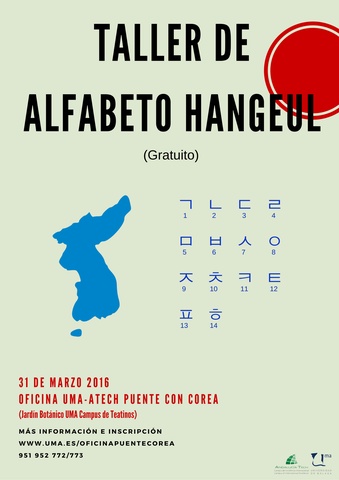
ACTIVITIES WITHIN THE RESEARCH PROJECT "KOREAN WAVE"
Duration: 2018-2021
Members:
- Patricia Chica Morales: Responsible for the activity. Coordinator of the Korea Office. Vice-Rectorate for Strategic Projects. Research line on gender equality in Korea.
- Antonio J. Doménech: Professor of the East Asian Studies Degree. Doctoral thesis on the role of Korean women in religion. Current research lines and teaching on gender issues.
- Aurelia Martín Casares: Professor of the East Asian Studies Degree.
- Luis Alberto Botella Sánchez: Professor of the East Asian Studies Degree.
- Eun Kyung Kang: Professor of the East Asian Studies Degree.
- Da Eun Eo: Professor of the East Asian Studies Degree.
- Mathías Montenegro: Master in Communication. Bachelor Thesis “Feminism and Satirical Communication.”
- Maite Nuño, Beatriz Reyes, Rocío Gambero, and Cristina Serradilla: Students of the East Asian Studies Degree.
Project content:
The objective of the activity was to create a series of “activities” framed as workshops and conferences that promote research with a gender perspective in Korean Studies and the dissemination of work that is already being carried out. These activities were carried out jointly with the Department of Korean Language at Incheon National University (South Korea), with whom joint seminars and conferences have previously been conducted. The ultimate goal of the activity was for this initiative to once again be a space for debate for the university community of UMA but also for Incheon National University interested in issues related to gender equality in South Korea and East Asia.
Methodology:
In both workshops and proposed conferences, a horizontal structure was established between the faculty and participating students of GEAOR. The proposed activities were conducted online, reaching a larger number of interested individuals.
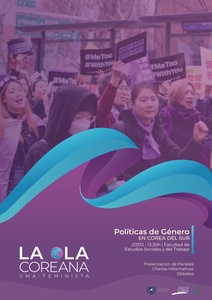
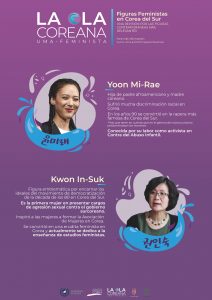
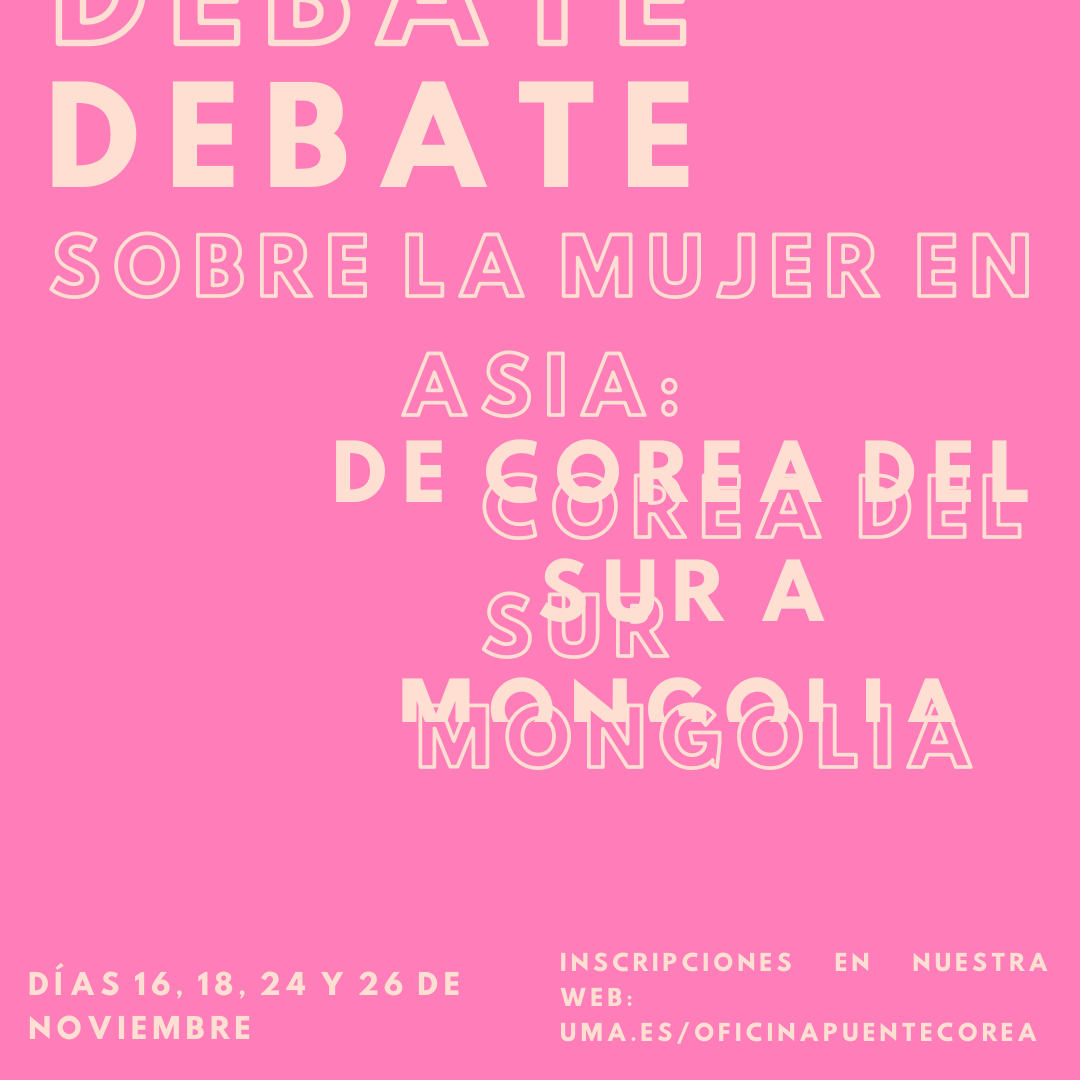
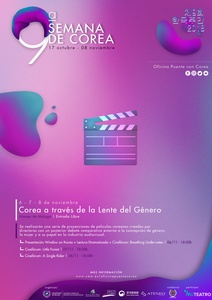
ACTIVITIES
Debate on Women in Asia: from South Korea to Mongolia: Four sessions held on November 16, 18, 24, and 26, 2020, online (via the Zoom platform) and live, divided according to the two geographical areas addressed.
November 16, 18: “Debates on women in Asia: Korea”. Social issues faced by women in South Korea will be addressed: sexuality, gender violence, masculinity, or the situation of trans women, among other topics; taking into account the South Korean historical and sociocultural context. In addition, a comparison with the West will be made to empathize with common reality. For this, speakers from Korea and Spain will share their personal experiences both in South Korea and in Spain.
November 24, 26: “Debates on women in Asia: Mongolia”. The social realities faced by women in Mongolia will be addressed: family, reverse gender gap, masculinity, gender violence, entrepreneurship and social and labor education, women in shamanism, and feminist movements; taking into account the historical and sociocultural context of Mongolia. For this, speakers from Mongolia and Spain will share their personal experiences both in Mongolia and in Spain.
- Korea through gender lenses: film series and debate aimed at giving visibility to the situation of Korean women, their transcendence in society and history, while reflecting on the role of women in the audiovisual field from three perspectives: creator, spectator, and protagonist. Various professionals from different fields participated in this debate.
- Gender Policy in South Korea; The Korean Wave: exhibition of works on the evolution of gender policies in South Korea and the current situation of women in the country. This was accompanied by a talk on feminist movements and #metoo in Korea, from the perspective of Spanish and Korean students; and with the contribution of the Dean of the Faculty of Social and Labor Studies, Ana Rosa del Águila.
- Cineforum; Cinema in East Asia and its global circulation: alongside the screenings, a previous introduction to the current situation of women in Asian cinematographies was conducted, which have experienced an increase in both the number of productions and the number of tickets sold since the beginning of the 21st century. Cine Asia and the student group subsequently held a debate based on the films watched and the reality reflected in them.
- Contemporary Korean Feminist Figures: presentation of panels where we briefly review the history of the most relevant Korean feminist figures of recent times. Women who have inspired change in their nation, who have dared to change the rules, and who continue to inspire us today to continue fighting for social equality.
THE AREA OF EAST ASIAN STUDIES STUDIES THE PROCESSES OF EQUALITY AND INCLUSION IN KOREA
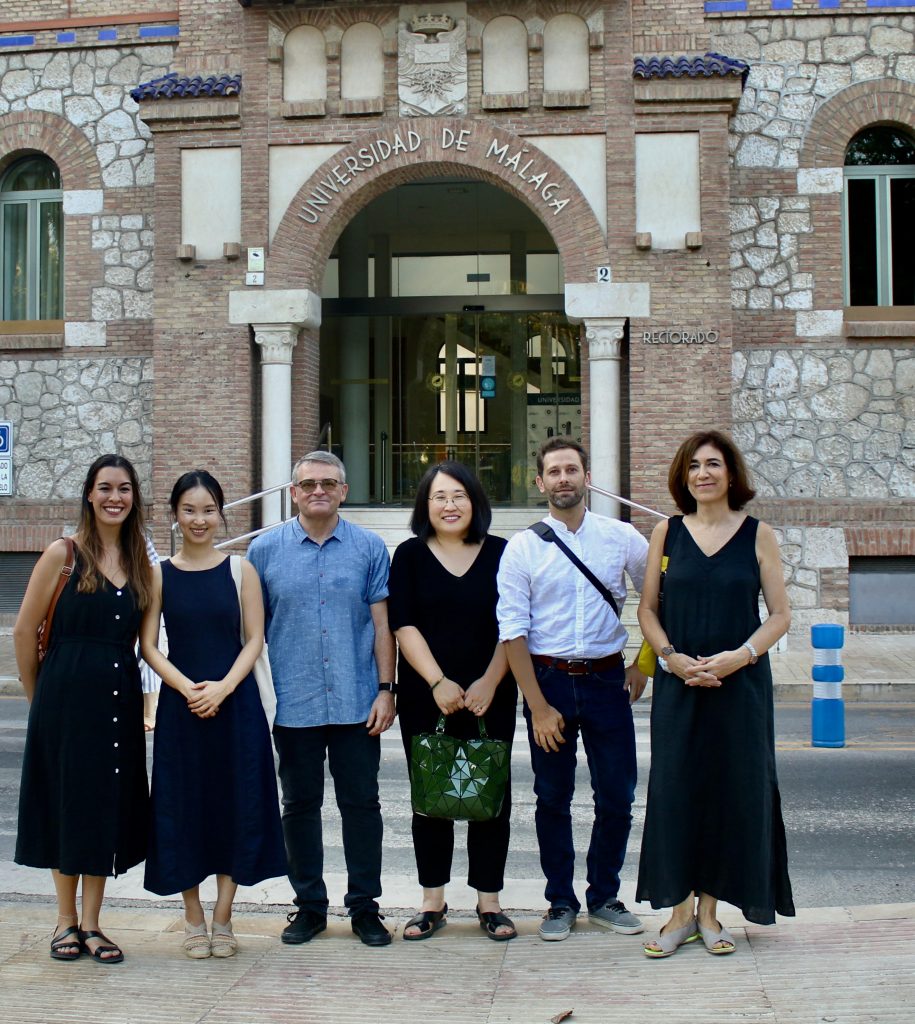
The East Asian Studies Area at the University of Malaga has been recognized with one of the two research projects that the Ministry of Education of the Republic of Korea, through the Academy of Korean Studies (AKS), has granted internationally in the ‘Advanced Seed Track’ category, in this case for the study of the processes of equality and inclusion in this country. The other selected institution has been the University of Copenhagen.
The AKS grants these prestigious grants to innovative research projects in Korean Studies. Thus, the grant awarded to the East Asian Studies Area-Korea Mention at UMA ‘Advanced Seed Track’ ‘Path to Equality: Korean Studies Network on Inclusiveness’ (KEI-Network, AKS-2021-INC-225002) investigate in detail, for five years, the processes of equality and inclusion in said country and the progressive integration of women into the public sphere.
It is led by Professor Antonio J. Doménech, director of the Bridge Office with Korea of the University of Malaga, and for its development, it has a total budget allocation of 325,000 euros, 65,000 annually. Aurelia Martín Casares, Kang Eun Kyung, Luis A. Botella, Eo Da Eun, and Patricia Chica are the other teachers who make up the research team.
The training of new researchers capable of developing Korean Studies in Spain and the Spanish-speaking world, as well as their integration into a multidisciplinary network that advances in the specific study of inclusion and equality, as main themes, are some of the objectives that will be pursued from this project.
We seek to train the next generation of Korean Studies academics, explains Doménech, who highlights the leading role of the UMA in this regard, whose Degree in East Asian Studies, currently taught in the Faculty of Social and Labor Studies, was created in 2012.
Likewise, the consolidation of undergraduate and postgraduate Korean Studies at UMA is another of the objectives that will be advanced from this research project.
SCIENTIFIC, PHILOSOPHICAL, AND SOCIAL ANALYSIS OF COVID19: SOCIAL IMPACT, ETHICAL IMPLICATIONS, AND CULTURE OF PREVENTION AGAINST PANDEMICS
Supreme Council for Scientific Research (CSIC). Reference: CSICCOV19-027, to analyze the impact of Covid-19 and its reflection in the media in South Korea.
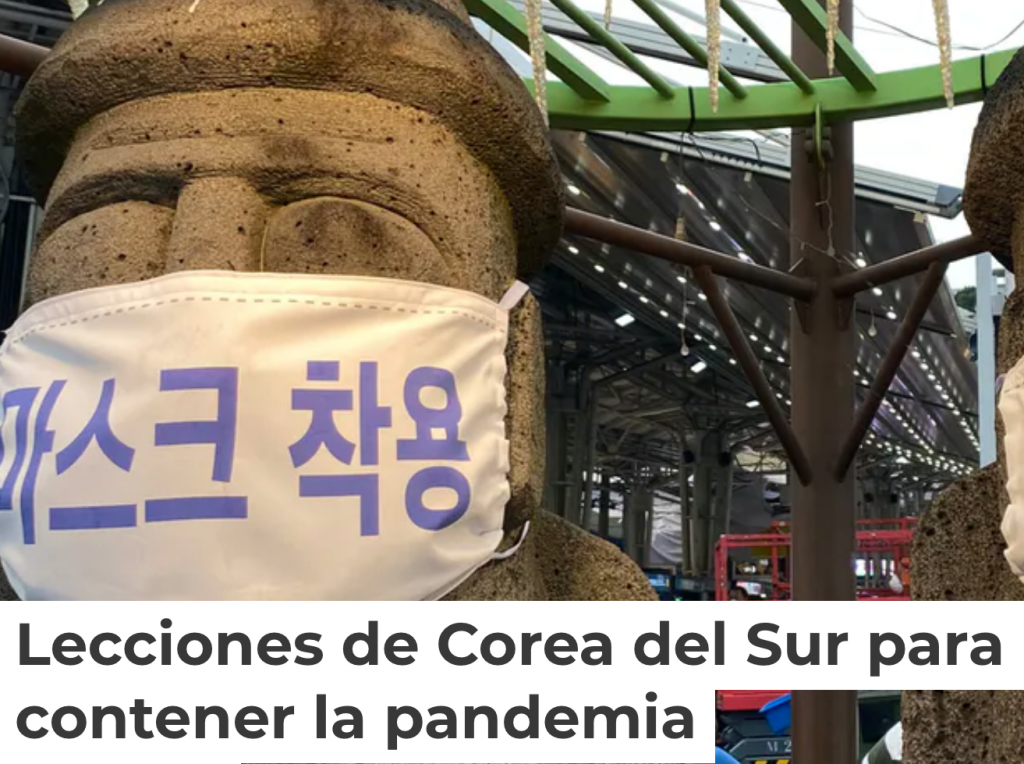
AKS -SEED PROGRAM FOR KOREAN STUDIES
The Academy of Korean Studies (AKS) collaborates with the University of Malaga in the “Seed Program for Korean Studies,” a project aimed at strengthening the Korean Studies program. At UMA, this project arises from the need to take Korean Studies to the next level, addressing the two main problems they present in Spain: the lack of master’s programs and the fragmentation in the field of Korean Studies. Therefore, through the project, it is intended to establish an Official Master’s Degree in Korean Studies and create research teams that consolidate the foundations of a stable academic community, focused on Korean studies in the Spanish-speaking world.
To this end, the Area works together with the University of Incheon and the Autonomous University of Nuevo León in the creation of a master’s program with two lines of specialization: the academic and the professional field.
In the field of academic research, research focused on studying the influence of cultural connections between Korea and the Spanish-speaking world on the emergence of new feelings of identity among young people is being carried out.
UNIVERSITY COOPERATION PROJECTS FOR DEVELOPMENT
The close relationship between UMA and Incheon National University (INU) has favored their collaboration in triangular cooperation projects in Spain and Latin America with other foreign universities, following objectives of internationalization and achievement of the Sustainable Development Goals (SDGs). The projects developed so far are:
- Green Ger Village Cooperation Project (Mongolia).
- Narratives and Voices of Resistance Cooperation Project for Peacebuilding in Colombia.
The general objectives of the projects are:
- Generate a critical, participatory, and supportive citizenship in a globalized world.
- Strengthen the image of UMA and INU as academic institutions committed to cooperation for development.
- Create joint projects for the creation and dissemination of knowledge.
- Promote research cooperation as well as cultural and human exchange in the participating universities.
